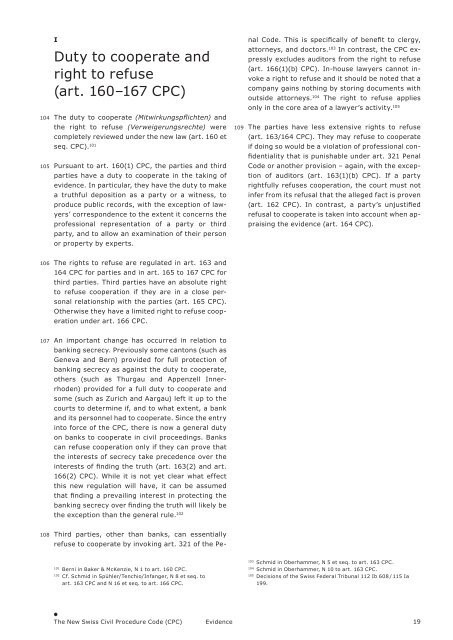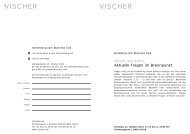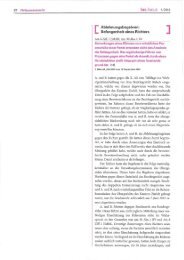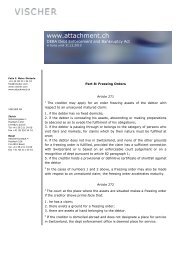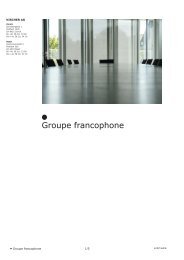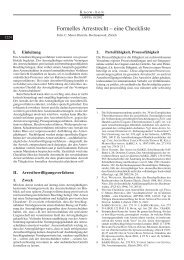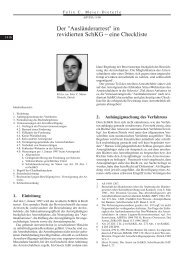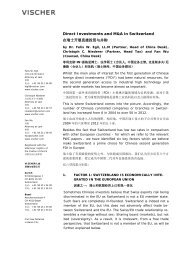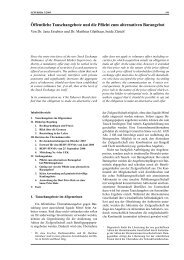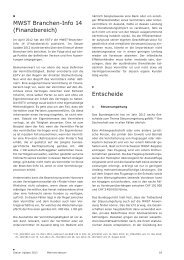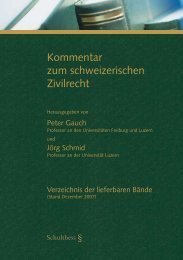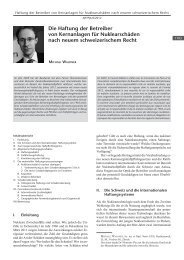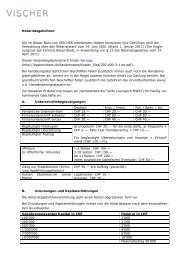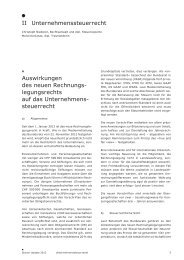The New Swiss Civil Procedure Code (CPC) - Vischer
The New Swiss Civil Procedure Code (CPC) - Vischer
The New Swiss Civil Procedure Code (CPC) - Vischer
Create successful ePaper yourself
Turn your PDF publications into a flip-book with our unique Google optimized e-Paper software.
I<br />
Duty to cooperate and<br />
right to refuse<br />
(art. 160–167 <strong>CPC</strong>)<br />
104 <strong>The</strong> duty to cooperate (Mitwirkungspflichten) and<br />
the right to refuse (Verweigerungs rechte) were<br />
completely reviewed under the new law (art. 160 et<br />
seq. <strong>CPC</strong>). 101<br />
105 Pursuant to art. 160(1) <strong>CPC</strong>, the parties and third<br />
parties have a duty to cooperate in the taking of<br />
evidence. In particular, they have the duty to make<br />
a truthful depo sition as a party or a witness, to<br />
produce public records, with the exception of law-<br />
yers’ correspondence to the extent it concerns the<br />
professional representation of a party or third<br />
party, and to allow an examination of their person<br />
or property by experts.<br />
106 <strong>The</strong> rights to refuse are regulated in art. 163 and<br />
164 <strong>CPC</strong> for parties and in art. 165 to 167 <strong>CPC</strong> for<br />
third parties. Third parties have an absolute right<br />
to refuse coopera tion if they are in a close per-<br />
sonal relationship with the parties (art. 165 <strong>CPC</strong>).<br />
Oth erwise they have a limited right to refuse coop-<br />
eration under art. 166 <strong>CPC</strong>.<br />
107 An important change has occurred in relation to<br />
banking secrecy. Previously some cantons (such as<br />
Geneva and Bern) provided for full protection of<br />
banking secrecy as against the duty to cooperate,<br />
others (such as Thurgau and Appenzell Inner-<br />
rhoden) provided for a full duty to cooperate and<br />
some (such as Zurich and Aargau) left it up to the<br />
courts to determine if, and to what extent, a bank<br />
and its personnel had to cooperate. Since the entry<br />
into force of the <strong>CPC</strong>, there is now a general duty<br />
on banks to cooperate in civil proceedings. Banks<br />
can refuse cooperation only if they can prove that<br />
the interests of secrecy take precedence over the<br />
interests of finding the truth (art. 163(2) and art.<br />
166(2) <strong>CPC</strong>). While it is not yet clear what effect<br />
this new regulation will have, it can be assumed<br />
that finding a prevailing interest in pro tecting the<br />
banking secrecy over finding the truth will likely be<br />
the exception than the general rule. 102<br />
108 Third parties, other than banks, can essentially<br />
refuse to cooperate by invoking art. 321 of the Pe-<br />
101 Berni in Baker & McKenzie, N 1 to art. 160 <strong>CPC</strong>.<br />
102 Cf. Schmid in Spühler/Tenchio/Infanger, N 8 et seq. to<br />
art. 163 <strong>CPC</strong> and N 16 et seq. to art. 166 <strong>CPC</strong>.<br />
<br />
<strong>The</strong> <strong>New</strong> <strong>Swiss</strong> <strong>Civil</strong> <strong>Procedure</strong> <strong>Code</strong> (<strong>CPC</strong>) Evidence<br />
nal <strong>Code</strong>. This is specifically of benefit to clergy,<br />
attorneys, and doctors. 103 In contrast, the <strong>CPC</strong> ex-<br />
pressly excludes auditors from the right to refuse<br />
(art. 166(1)(b) <strong>CPC</strong>). In-house lawyers cannot in-<br />
voke a right to refuse and it should be noted that a<br />
company gains nothing by storing documents with<br />
outside attor neys. 104 <strong>The</strong> right to refuse applies<br />
only in the core area of a lawyer’s activity. 105<br />
109 <strong>The</strong> parties have less extensive rights to refuse<br />
(art. 163/164 <strong>CPC</strong>). <strong>The</strong>y may refuse to cooperate<br />
if doing so would be a violation of professional con-<br />
fidentiality that is punishable under art. 321 Penal<br />
<strong>Code</strong> or another provision – again, with the excep-<br />
tion of auditors (art. 163(1)(b) <strong>CPC</strong>). If a party<br />
rightfully refuses cooperation, the court must not<br />
infer from its refusal that the alleged fact is proven<br />
(art. 162 <strong>CPC</strong>). In contrast, a party’s unjustified<br />
refusal to cooperate is taken into account when ap-<br />
praising the evidence (art. 164 <strong>CPC</strong>).<br />
103 Schmid in Oberhammer, N 5 et seq. to art. 163 <strong>CPC</strong>.<br />
104 Schmid in Oberhammer, N 10 to art. 163 <strong>CPC</strong>.<br />
105 Decisions of the <strong>Swiss</strong> Federal Tribunal 112 Ib 608 / 115 Ia<br />
199.<br />
19


